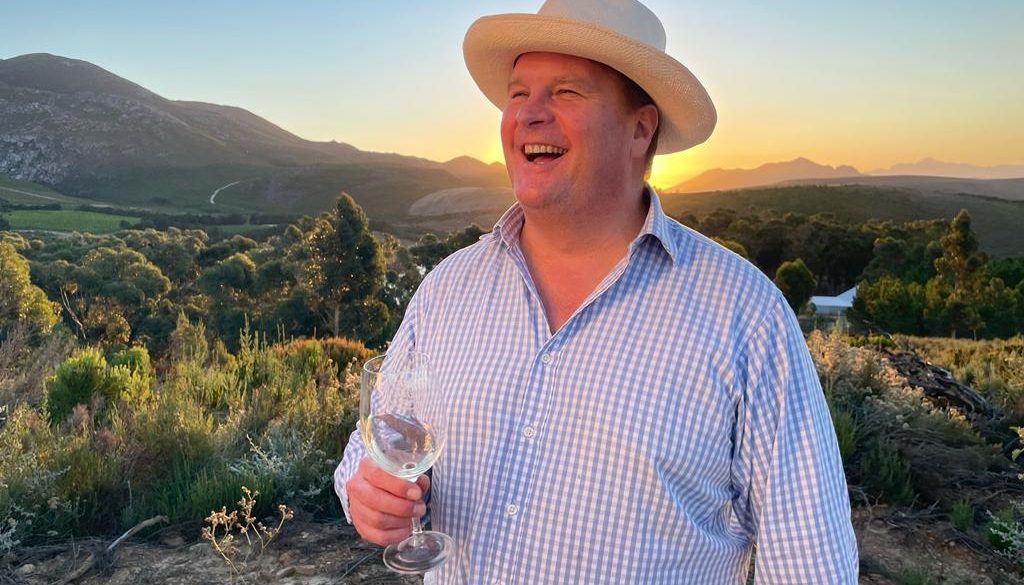I am sure we have all heard the joke: “How do you make a small fortune in the wine industry?” Answer: “Start with a big one.”
It always gets a laugh. But it always makes me feel uncomfortable, because not only is it incorrect, but it’s also about laughing at failure.
The same joke could be made about most industries of course. Have you ever wondered why it isn’t? Take music. You never see people rubbing their hands with glee as a young artists hits the skids.
From a dispassionate investment perspective, the financial success rate is multiple times higher in the wine industry than in many others, but what titillates the cynically-fueled onlookers are the financial trainwrecks, not the old jalopies – those struggling businesses held together with duct tape and passion – limping honourably up the hill. Rather the joke is targeted at often very wealthy captains of some over industry failing at something as simple as wine.
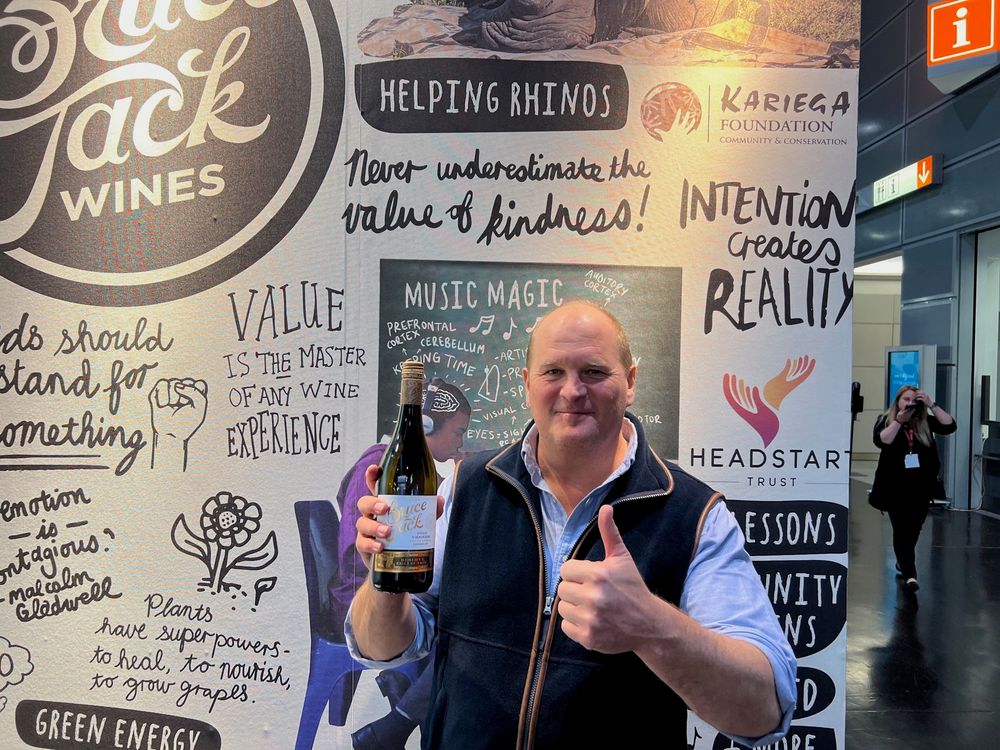
When he is not making wine Bruce Jack is relentlessly out in the world marketing and talking not just about his wines but about the passion needed to make them
There is always some truth in clichés, of course, but they obscure the nuances. Firstly, the wine industry is like everything in life. If you are completely committed (financially or otherwise) you will eventually summit the hill. If you aren’t fully committed that probably won’t happen, but it can still be enjoyable and worthy; it just becomes a very expensive hobby, often one the follow-on generation of big-splash investors resents.
I’ve been fortunate to have made a living from the wine business for almost forty years. But I still feel like a total beginner because wine is so enthrallingly complex. I feel like I’ve only just scratched the surface. In a family business it’s an industry which demands the total dedication of generations to successfully grapple with the depth of it.
Outside the comfort zone
And that’s where things get messy. About a year ago the kids convinced me to hire a marketing consultancy company. A team of young, sharply-dressed, slightly jumpy people arrived at the winery. They were there to design a rescue strategy for our marketing efforts. They were brimming with coffeedence. All they needed, they said, was a “highkey origin story” of the Bruce Jack wine business for social media. I had no idea what “highkey” meant, but was too intimidated to ask.
“It will be lit! You know, dude, get naked on how you got the crazy idea,” they enthused.
So, I wrote the story of how I became a winemaker. At the next meeting it was rejected with a pitying roll of the eyes: “Literally way too granular”… “No feels, Bruce, no feels”… and, “Like not totally wack, but like too old-school.”
Maybe they’re right. As I steep my morning cup of tea, I worry about how I am meant to communicate with our consumers using smile-sized flashes on social media. I could never understand how intelligent people get transfixed by Instagram – until I found myself scrolling through surfing clips at 3am. Social media not only befuddles me, it terrifies me.

Bruce Jack Wines' Instagram page has become much more lifestyle driven
The young advertising team had any easy solution to all these concerns, however. I was advised to “young-up!” Like other “personalities” in the “brand-space”. What they meant was stop the second bottle of Pinotage and start jogging. I was told I needed to be full of pep and vim and “share my best life with the world on Insta”.
But, of course, that’s unlikely. I sport a look of forged-resolve weariness, long in the sculpting. I am clearly not beguiling Instagram fodder. My eldest boy says I look remarkably like a thumb – the result of too much rugby in the front row and too many delicious meals.
How did I suddenly arrive in this startling future? I am not that worried about the youth. It’s normal to feel alienated from those born a quarter of a century after you, but it’s my peers who are freaking me out. They enjoy relaxing yoga after a day of captivating capitalism. I know this because my sons show me pictures of them mid Downward Dog pose with a sunset backdrop. I am clearly a man out of step with peers.
In this regard, at least, not much has changed. As most of us are pushed away from the relative haven of youth, the brutal road of adult life is inevitably potholed and rough, with enticing side-streets you were warned against exploring.
Following your path
It is one of the cruel truisms that while young and inexperienced, we are forced into life-defining decisions. Our early choices of lifestyle, partners, occupation, etc.… cast a long shadow over our future. But I have also learnt that on rare occasions, a positive path chooses you, and then it’s like a sort of miracle. This is how I became a winemaker.
A little over 30 years ago I asked the South African poet, Stephen Watson, why he wrote. We were sitting around a crackling fire, late at night, high in the Cederberg mountains, eating olives and drinking red wine. I had gone to find him to talk about what I should do with my life, because I thought I was going to be a writer.
“I write because I feel I have to,” he explained. “You write because you want to”. He didn’t mean it unkindly, but it stung.
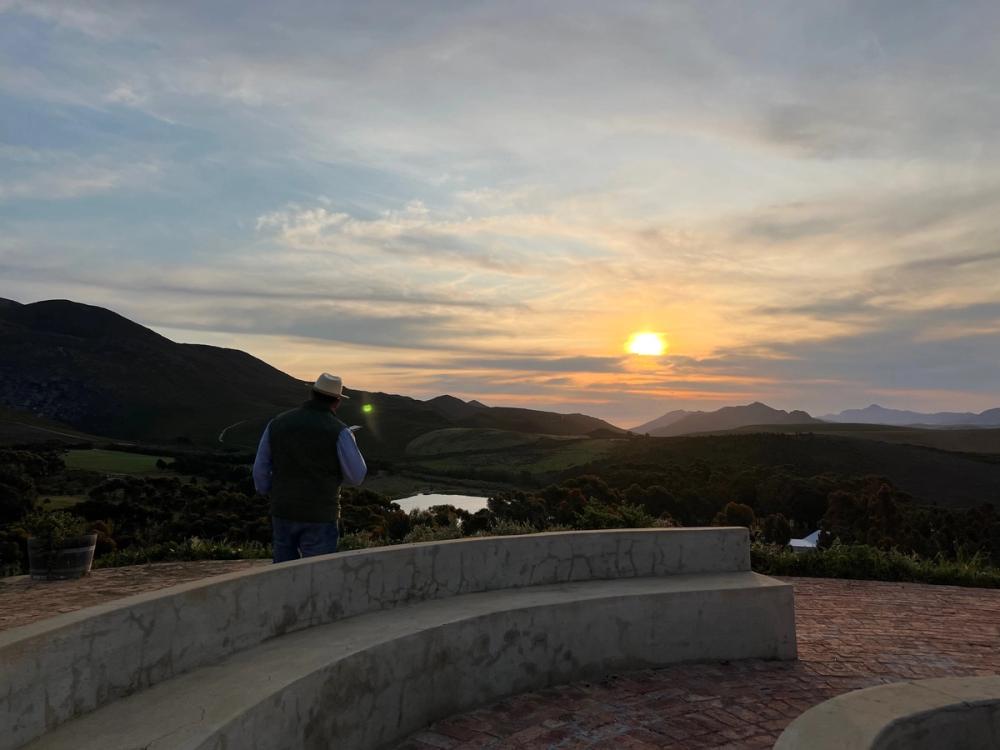
Bruce Jack contemplating life high up on his Drift Estate farm in the Overberg Highlands
There is often an upside to having your ego trampled upon. For me, I was freed from all sorts of expectations, including my own self-delusional ones. Thankfully, it wasn’t long before I discovered what I felt I had to do.
Unfortunately it was neither exciting nor romantic, and certainly not as impressive as most of my young adult peers. I discovered that not only do I feel completely at home in wineries, but that I absolutely love making wine that brings a little bit of joy into the world. My peers couldn’t understand why I chose physical labour over a career in banking or marketing or academia. But this physical labour just happened to be in a winery and was required for the creations.
But let’s start at the beginning. Wine is different because it has, at its soul, our primeval human drug, alcohol. Consequently, winemaking is different from other occupations. Not only is it an ancient way of earning a crust, but is imbued with all the atavistic fascination, responsibility, hazards, enlightenment and legal bureaucracy these facts encompasses.
We have been utilising alcohol for a very, very long time. It has always been a portal into the spiritual realm. That’s why the word ‘spirit’ has two distinct, but related meanings. Initially alcohol helped us connect and commune with our gods and grapple with the mind-bending questions of existence. Millennia later it is still central to many of our religions.
Archeologists postulate that alcohol was produced by humans well before we started farming. Fermented fruit, or more likely,a rain-and-honey mixture in a hollow tree trunk, got the party started – long before our Homosapien relatives left Africa and trekked north into Europe. There, Uncle Bob (or his ancient equivalent) stomped on some grapes and we were off to the races.
Natural miracle
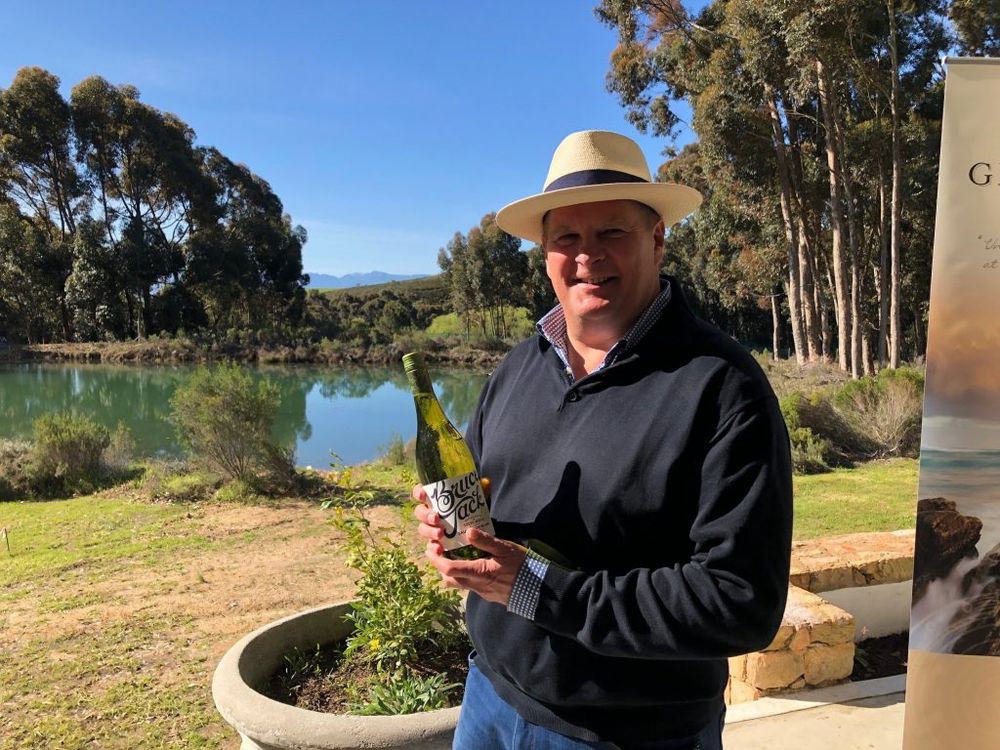
Bruce Jack says he feels so lucky to have found his calling in life to be a winemaker
This is why wine has become the most storied, celebrated and richly imbued form of our ancient spirit vehicle. Once we discovered this natural miracle, crafted by universal design, we have spent so much effort, over so long, to embellish, re-imagine and load with meaning, magic and symbolism, this human staple – wine.
There is no other everyday product older than all cities, all current religions, and most social customs. Wine exists beyond the grappling of egos of the obsessed, or even the limitless borders of accountants’ Excel spreadsheets. There is no industry as resilient to human vagaries and misguided ambitions. It comes to us from a world beyond history – from the realm of archeological postulation. It is a product intensely connected with the divine and ruled by the weather. Layers of millennia have created a sheen so luminescent, we can see ourselves in it. It’s good to remember you are just a reflection.
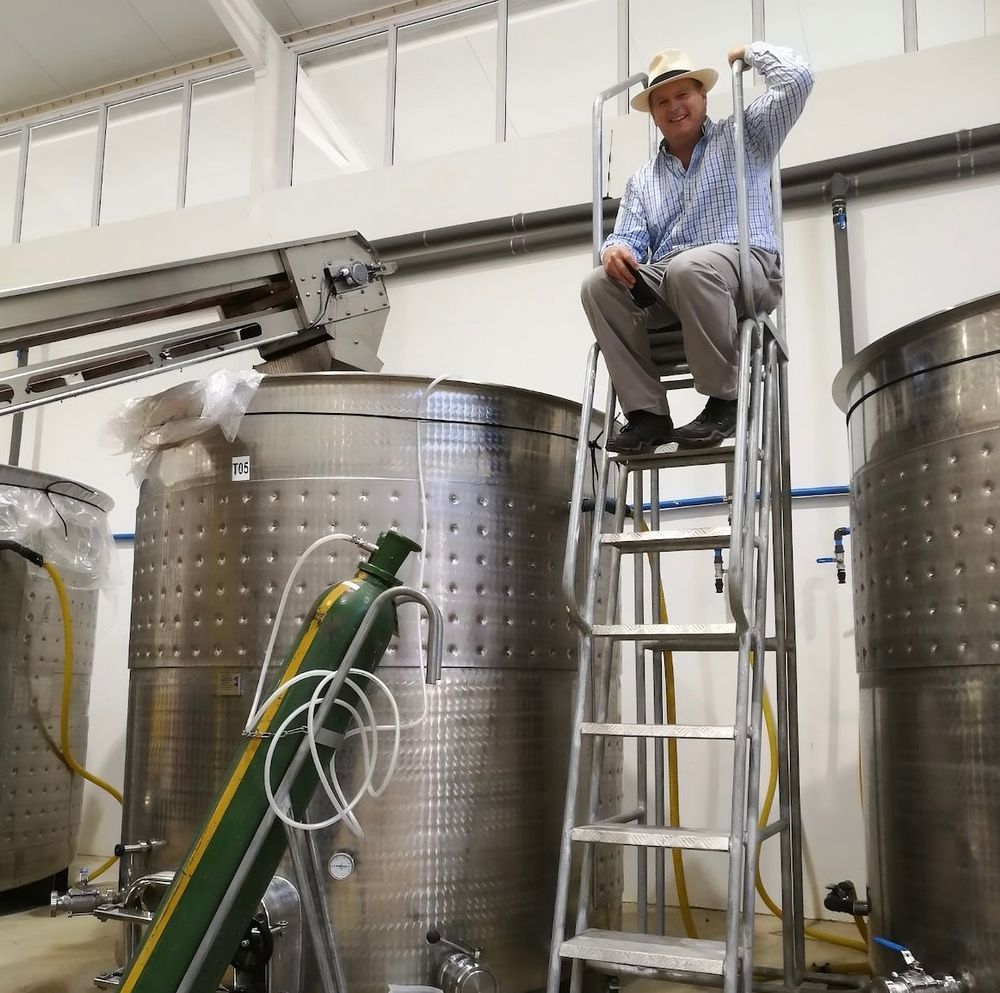
Bruce Jack where he is at his happiest - amongst his fermentation tanks in his winery
This is why, when a life of wine chooses you, you will always be in way over your head. The entanglement is mesmerising. It defies a neat “origin story”. In fact, the more you try to “find your way” in the world of wine, the more lost you become in the universe.
Winemaking, the way I was taught the craft, is physically demanding. Every self-respecting action movie includes a spectacular car chase. Crushing and fermenting the grapes are the car chases of a winemaker's year. In California they call it ‘The Crush’; in South Africa it’s called ‘Vintage’. Whatever the words, they mean ‘Right of Passage’ when you start out, and they continue to offer challenge and euphoria in equal measure because harvest time is addictive.
Cracked hands are stained purple, leaving deep little cuts that sting when you clench a fist. And the coffee-stain rings under your eyes mark you an insomniac, or perhaps (because of that idealistic look in your eyes) a revolutionary. Backs are stiff, tendons strained, patience frayed. When people ask you what you do, you describe the physical work like it will save the world because nothing lets you know more conclusively that you have achieved something worthwhile, than aching fatigue.
Physical labour has a spiritual reward that no amount of gym sessions can ever replicate, especially when it results in the creation of something so beautiful and magical, and simultaneously so beyond yourself.
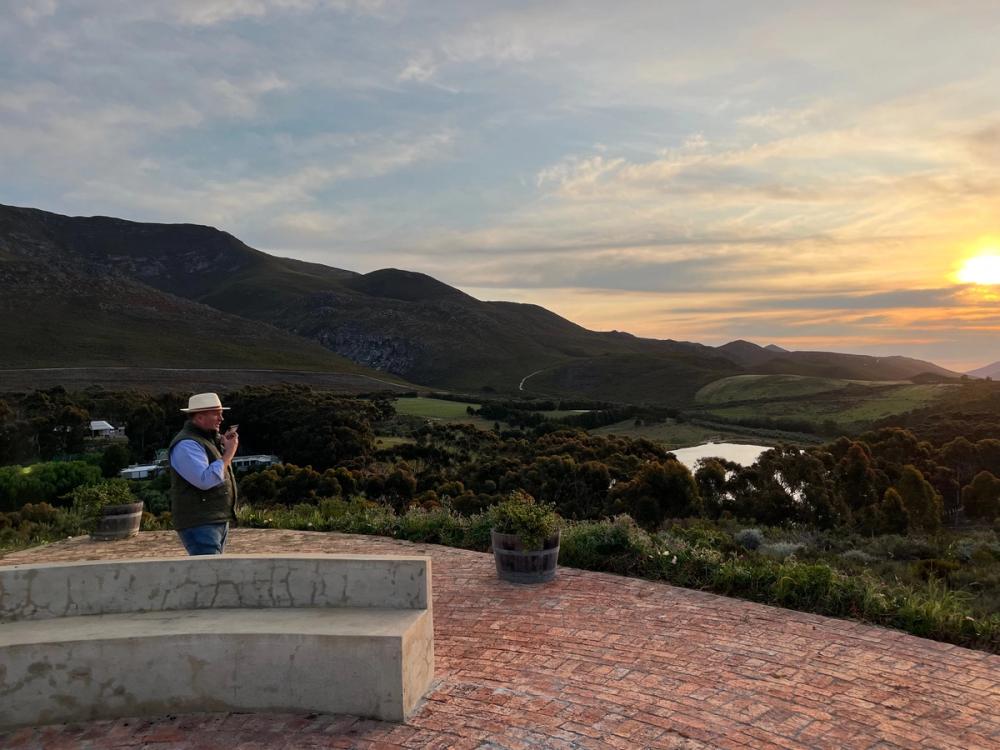
Work never really stops for a successful winemaker...
Because it is such a natural, ancient staple few can imagine the logistical minefield that wine production is. This is partly because of the flawed “non-interventionist” mythology peddled by “natural” wine marketers (winemaking isn’t about whether one intervenes, but how one intervenes – if you honestly practice non-interventionist winemaking, you wouldn’t pick the grapes).
Fraught with danger
The management of a winery during harvest is like playing Tetris while scrambling up a steep mountain path in wet work boots. This mental and physical challenge is enticing, but mostly dangerous. People die in wineries. They are places packed with threats like slippery surfaces at height, CO2 asphyxiation, corrosive cleaning chemicals like caustic soda that melts your skin away, mechanical equipment that removes digits, hands and feet, and all the while you are surrounded by deadly amounts of electricity in a continuously wet environment.
I have spent half my working life writing Occupational Health and Safety manuals in various languages in an attempt to keep young, foolhardy cellar hands safe. Because I’ve spent so long in them, wineries comfort me. I love the smells, revel in the lack of people and still get a buzz from driving forklifts. But wineries also terrify me. I have a rule never to hire an intern whose family I know. It’s too stressful trying to keep them safe.
And while you are getting soaked in sticky grape juice and earning your wine-stained hands, you must remember that soon the fun will be over, and you must once again get to grips with supply chain logistics, interests rates, packaging design, consumer behaviour, tax liabilities, the anti-alcohol lobby, post-harvest soil health, global economics, container shortages, exchange rates, socio-politics, duty increases, marketing, press relations, spreadsheets, blood-sucking banks, customer communication, supermarket wine-buyer agendas, sommelier egos, bonded assets, insurance policies, industry regulations, ProWein hotel costs, carbon footprints, team motivation, human resource management, and in the case of South Africa - collapsing infrastructure, fuel shortages and the insidious disregard of a corrupt government... to name just a few.
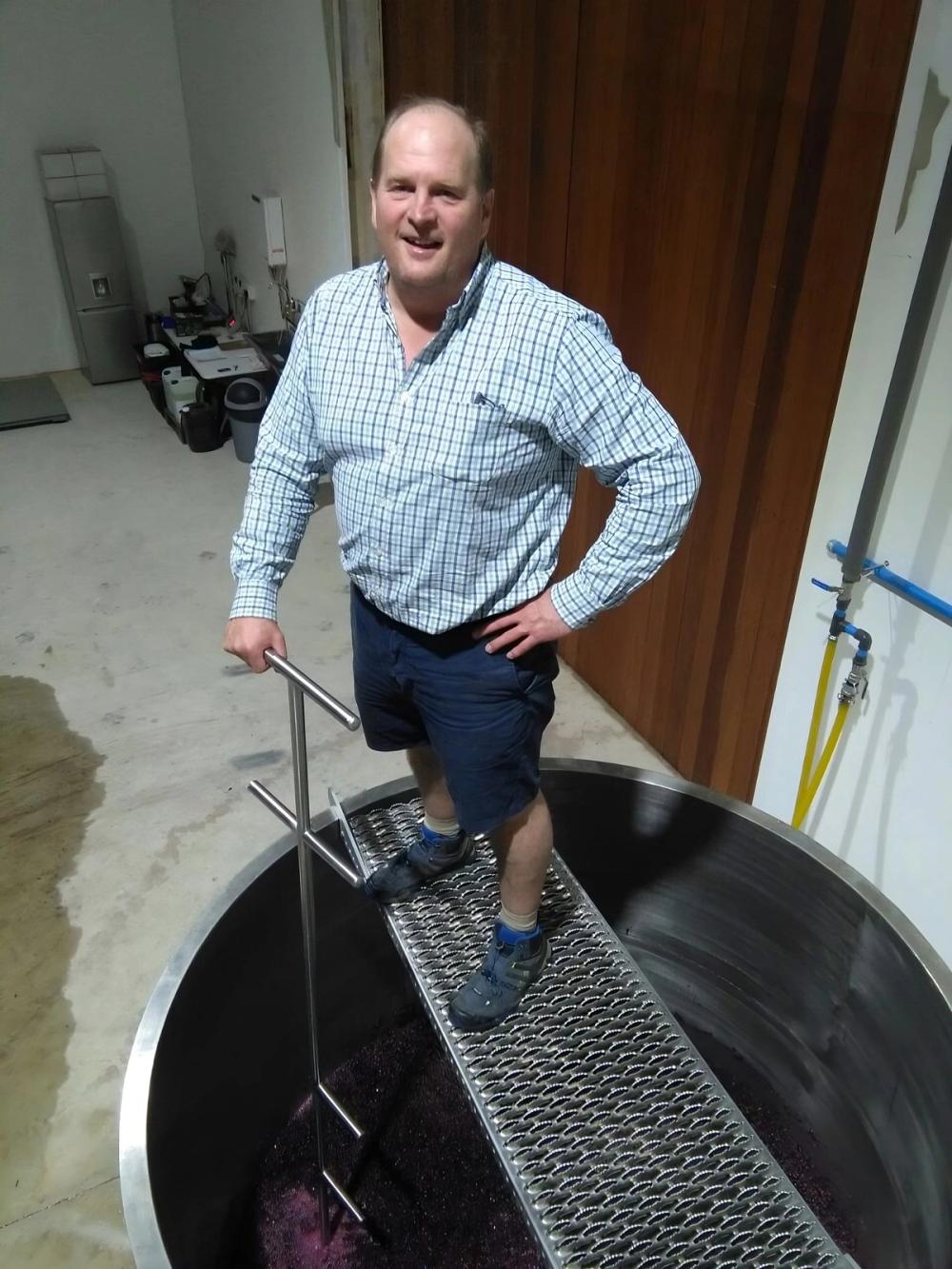
Careful as you go...Bruce Jack on top of a fermentation tank
Depending on what sort of person you are, some of these are easy to master, but no one masters all. If you have come to the industry with deep pockets you can hire the expertise to handle those elements you can’t master, or don’t feel like fighting with. But if you must survive off your wits, your talent and tenacity, while borrowing from banks, you must accept that you will have to try and do it all yourself, and will therefore always be on the back foot. This is the nature of such a life-choice. You must embrace the chaos like a friend, you must want to wrestle with unbeatable odds in dark places, and you must relish that daily fear of failure, even as it occasionally overcomes you.
Making it pay
One critical (in fact the most critical) thing they don’t tell you much about in a science-heavy BSc Oenology and Viticulture degree, is the most difficult facet of the whole endeavour – at some stage wine has to be sold profitably.
If you don’t care about the intrinsic qualities of the wine you produce, that’s easier to achieve. This is why good winemakers generally make bad CEOs of wine businesses, and why good CEOs generally make bad winemakers. In wine production, tempting simplicity lives where compromise thrives. And good winemakers are really bad at compromising.
Most winemakers, whether they like it or not, end up being salespeople to some degree. The natural charismatics among us shine in this role and some unhelpfully fuel the idiotic ‘cult of the winemaker’ mythology.
The quiet, deep-thinkers, the creative melancholics and fastidiously detailed types, always make the better winemakers, but never the best salespeople. Similarly, slick showmanship generally corresponds to less diligence in the vineyard and cellar. So, if there’s a charismatic, engaging winemaker with a flamboyant style, look behind them into the dark recesses of the winery to discover who is really applying their intent, and pouring their heart into the production process.
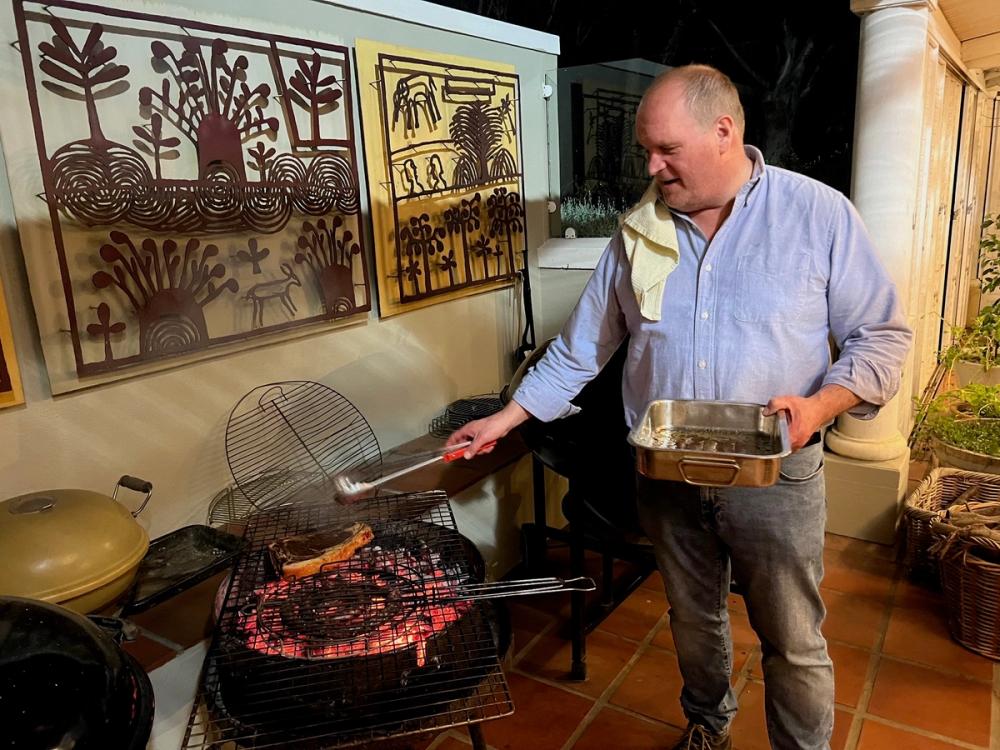
You can't be a good South African winemaker unless you are good on a braai too...
The unheralded commitment, unseen attention-to-detail and empathy required for proper winemaking, all combine to create an energy that is carried by the alcohol into your brain and dreams. We all intuitively know this is true, even though there is no scientific explanation for it. The easiest way to describe the phenomenon is something we have all experienced – a meal lovingly prepared by someone who cares for us always satisfies far more than food made by someone who doesn’t know us – no matter how many Michelin stars. Somehow, the intention becomes the vital ingredient. And so it is with wine, and because we are also dealing with a drug, the effect is intensified. So chose your winemaker carefully.
Truthfully explaining a career choice of winemaking is a bit like telling people you are spiritually fulfilled by being a diesel mechanic, or a drystone wall mason, or forester... Only a few would understand the attraction of purposefully choosing a life of physical labour, calloused hands and battling single digit profits and the climate simultaneously.
Only a few would understand intentionally wanting to work in a factory. And ‘winery’ is just another word for ‘factory’. Like most factories there is nothing enticing about working in them. They are inevitably dark, cold, wet, loud and dangerous places in which to find your calling. It’s a work environment of sharp edges and hard surfaces.
Over the years, this environment takes a physical toll on your back and joints, until your only choice is to step aside for younger bodies; just when you have learnt all the lessons and tricks.
* You can find out more about Bruce Jack and his wines at his website here.
